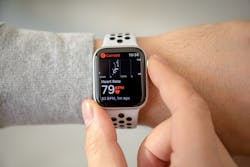Wearable devices can identify COVID-19 cases earlier than traditional diagnostic methods, and can also help track and improve management of the disease, concluded Mount Sinai researchers who studied the topic and published their findings in the Journal of Medical Internet Research.
The “Warrior Watch Study” from the New York City-based health system was led by Robert Hirten, M.D., and Zahi Fayad, Ph.D., of the Mount Sinai COVID Informatics Center. The goals of this study were to understand the impact of COVID-19 on the psychological well-being of healthcare workers and learn how this stress can be relieved. Researchers also said they hoped to identify COVID-19 infections in Mount Sinai’s employees prior to the onset of symptoms.
It’s now been revealed that the study found that subtle changes in a participant's heart rate variability (HRV) measured by an Apple Watch were able to signal the onset of COVID-19 up to seven days before the individual was diagnosed with the infection via nasal swab, and also to identify those who have symptoms, according to researchers.
The researchers enrolled several hundred healthcare workers throughout the Mount Sinai Health System in an ongoing digital study between April and September 2020. The participants wore Apple Watches and answered daily questions through a customized app. Changes in their HRV--a measure of nervous system function detected by the wearable device--were used to identify and predict whether the workers were infected with COVID-19 or had symptoms. Other daily symptoms that were collected included fever or chills, tiredness or weakness, body aches, dry cough, sneezing, runny nose, diarrhea, sore throat, headache, shortness of breath, loss of smell or taste, and itchy eyes, researchers explained.
What’s more, they found that 7 to 14 days after diagnosis with COVID-19, the HRV pattern began to normalize and was no longer statistically different from the patterns of those who were not infected. "This technology allows us not only to track and predict health outcomes, but also to intervene in a timely and remote manner, which is essential during a pandemic that requires people to stay apart," said Fayad.
"This study highlights the future of digital health," added Hirten. "It shows that we can use these technologies to better address evolving health needs, which will hopefully help us improve the management of disease. Our goal is to operationalize these platforms to improve the health of our patients and this study is a significant step in that direction. Developing a way to identify people who might be sick even before they know they are infected would be a breakthrough in the management of COVID-19."
Other wearable companies, such as Fitbit, have also explored research in this area using their devices. In August, Fitbit released findings from a study showing that its wearable device can detect nearly 50 percent of COVID-19 cases one day before participants reported the onset of symptoms with 70 percent specificity.
Researchers say the study will next take a closer look at biometrics including HRV, sleep disruption, and physical activity to better understand which health care workers are at risk of the psychological effects of the pandemic.


